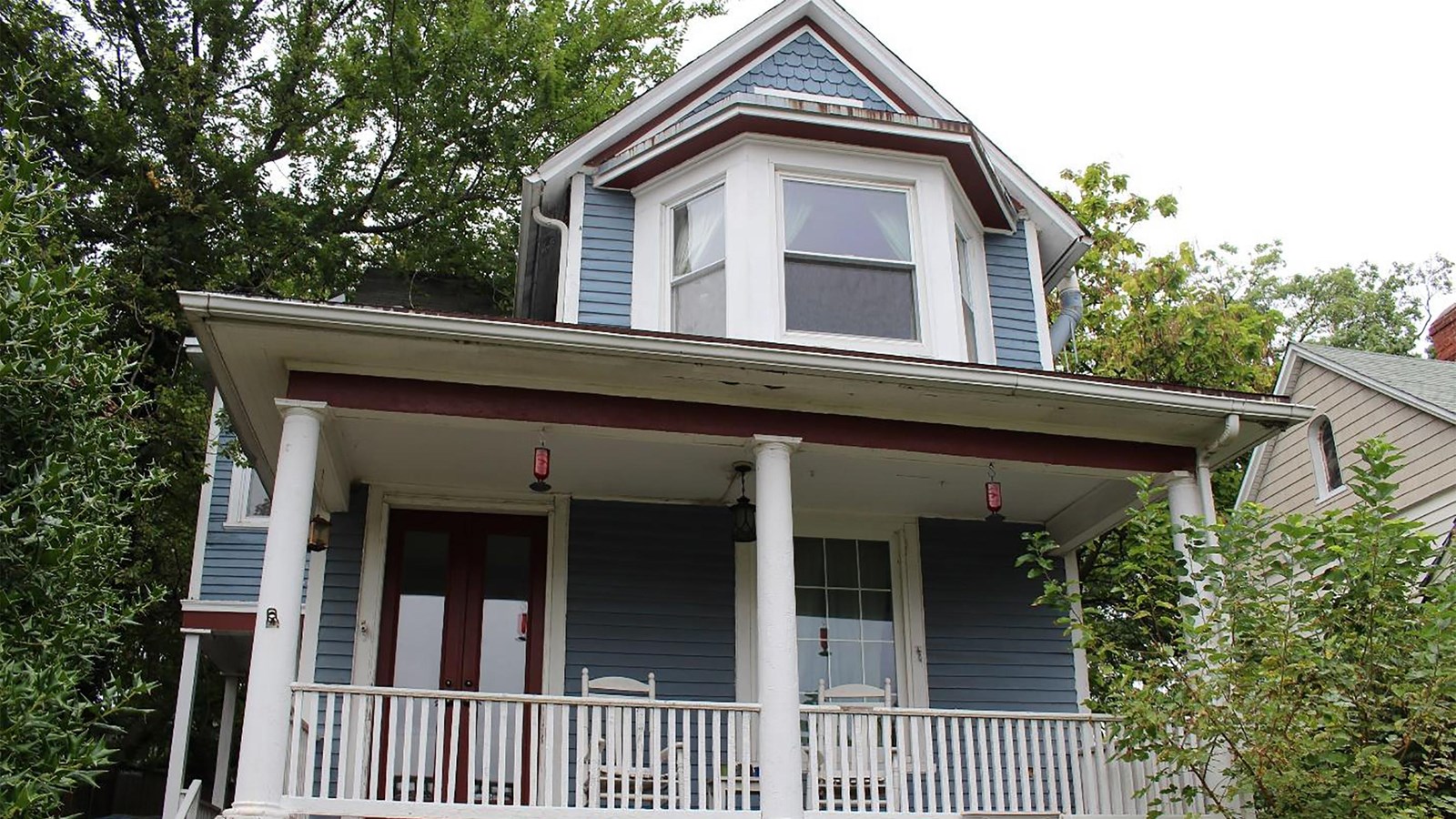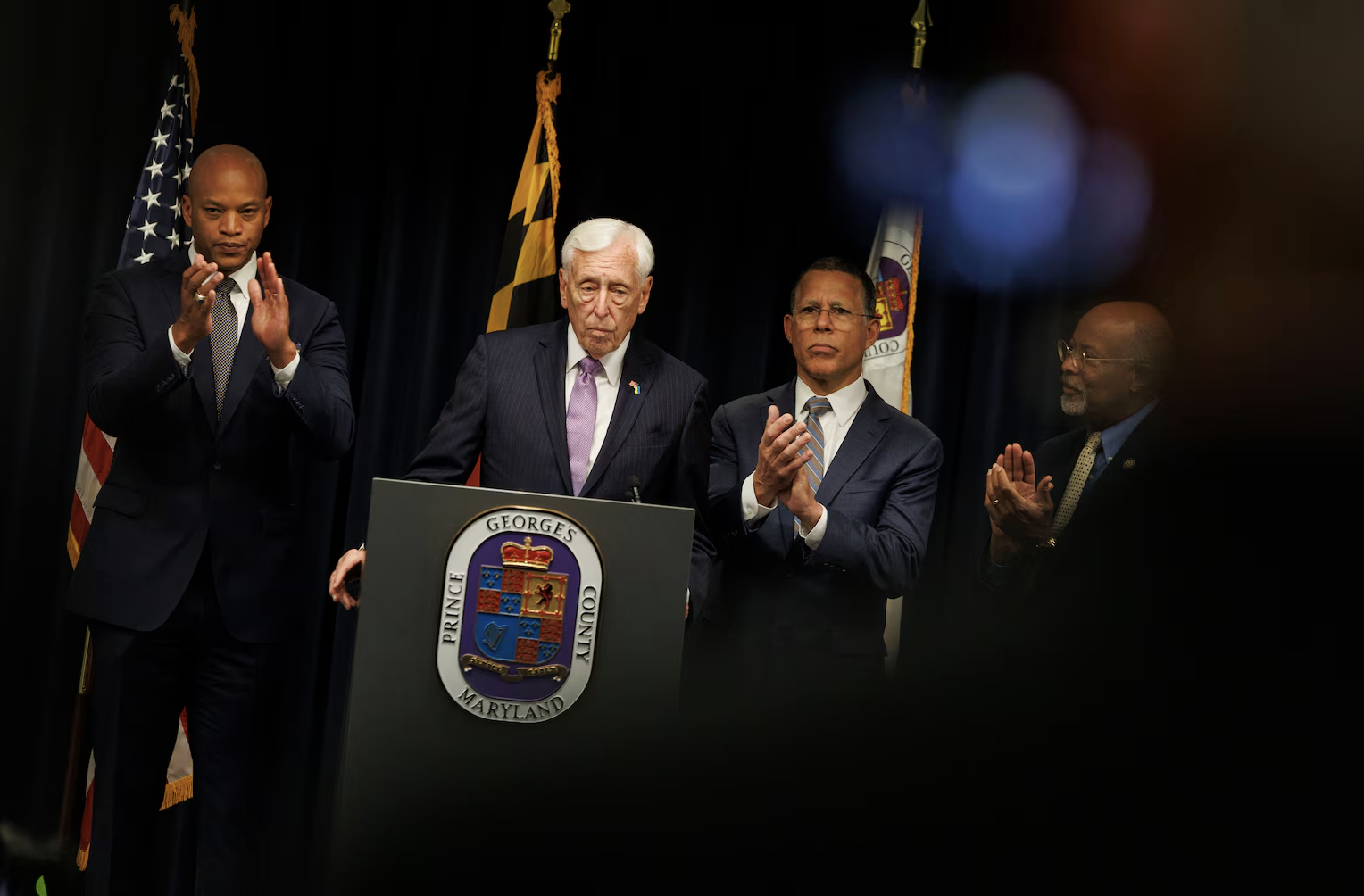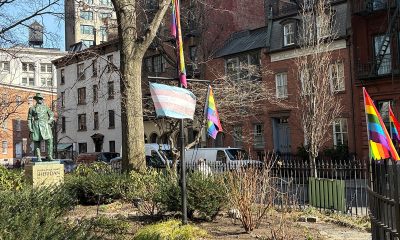Local
Will the Slowe-Burrill House become a National Landmark?
Process raises questions about what constitutes LGBTQ history

On Oct. 5, 2020, the Slowe-Burrill House was put on the National Register for Historic Places for its association with Lucy Diggs Slowe, most recognized for her work as the first Dean of Women at Howard University, where she served from 1922 until her death in 1937.
Even before her appointment at Howard, she boasted an extraordinary vitae. As an undergraduate at Howard, she was a founding member of the first sorority for African-American women. After graduating valedictorian of her class, and earning her master’s at Columbia University, Slowe took a position teaching at the Armstrong Manual High School in D.C., where she so impressed the school board that they appointed her to found the first-ever junior high school for African Americans in the national capital region.
As Tamara Beauboeuf-Lafontant describes in her book-length study of Slowe’s deanship, “To Live More Abundantly,” Slowe’s tenure at Howard was defined by her advocacy for what she called the “New Howard Woman” in her inaugural address to the students, a woman who was “of extreme culture and refinement.” She worked tirelessly, often at odds with the administration, to encourage the women of Howard to pursue the social sciences, not just the liberal arts thought to befit future mothers, and to explore careers outside of teaching, which was, as Slowe described, “the only occupation which is open to them with few handicaps.” Slowe was unsatisfied with the absence of women’s housing on campus, which she argued was necessary as a “laboratory for practical education in human relationships,” and orchestrated funding from Congress to build three new dormitories for a Women’s Campus. Slowe was so successful in her projects that, as one student reported, “we spoke among ourselves of our dean, not as Dean Slowe but as Dean Swift.”
Given Slowe’s remarkable life, and the National Park Service’s registration of her house as a historic site in recognition of that life, one would be forgiven for wondering why the site is titled the “Slowe-Burrill House” after both Slowe and her life partner, Mary Burrill. While the National Register nods to Burrill’s career as a teacher and playwright, it makes clear her historical significance is primarily as Slowe’s partner. The title of the site is less in recognition of Burrill herself than of Slowe and Burrill’s same-sex relationship at a time in which it would have been especially risky for a public figure like Slowe. While Slowe and Burrill were able to frame their partnership within 19th century ideals of romantic friendship, those ideals were coming under increasing scrutiny by the 20th century, which saw the pathologizing of women’s intimate relationships in the growing medical discourse around sexuality.
Now the Slowe-Burrill House is up for nomination as a National Landmark at the next meeting of the National Historic Landmark Committee this spring. Dr. Susan Ferentinos, a specialist in LGBTQ public history, was contacted by the National Park Service back in 2016 to help identify potential landmarks related to LGBTQ history. Ferentinos noticed there was a particular absence of LGBTQ landmarks in D.C., and put together a shortlist of sites including the Slowe-Burrill House. Ferentinos has been working through that list since, most recently preparing a national landmark nomination for the Furies Collective, which the Blade reported on in November.
But the bar for a National Historic Landmark is far higher than for the National Register of Historic Places. Only 3% of items on the National Register earn a further designation as a National Historic Landmark, and the priority for federal funding that goes with it. Will the Slowe-Burrill House meet that higher bar?
One way a site gets approved is by association with a nationally significant figure, and Lucy Diggs Slowe certainly has the national standing required. As Dean of Women, her work extended far beyond the campus of Howard University. Slowe established the National Association of College Women, an alumnae organization for Black women college graduates across the country. Under her leadership, the organization raised money to help young Black women attend college, worked to institutionalize gender equity in higher education, and led initiatives to foster interracial understanding with white college alumnae. Slowe was the first Black member of the National Association of Deans of Women, where she endlessly fielded her white peers’ concerns with racial matters on campus. And Slowe served on the national board of Young Women’s Christian Association, which gave her the connections she needed to go on a cross-country tour of colleges to talk about race relations among college women.
But if Slowe’s impact on women’s and African-American history on a national level is undoubtable, things are less clear when it comes to her mark on LGBTQ history. Slowe’s relationship with Burrill was a private matter, and not one she sought to advertise on the national stage. If Slowe’s house becomes a national landmark, will it still be as the Slowe-Burrill House? Or just the Slowe House?
That question arose early in Ferentinos’s work with Kathryn Smith, the National Historic Landmarks Coordinator for the Capital Region. On an early draft for the nomination, Dr. Ferentinos got the feedback that perhaps Slowe wasn’t really a national figure in LGBTQ history, and that they should be focusing on other criteria of national significance. But Ferentinos, who made it clear she does not speak for the National Park Service, vehemently disagreed. “I said to [Kathryn Smith], I feel so strongly that this property is significant to LGBTQ history. What this feedback is telling me is that I haven’t done a good enough job yet. I’m willing to do a couple extra rounds of revision … in order to do this right because it is really important.”
As Dr. Ferentinos sees it, LGBTQ history is often simply figured as a history of political activism, which excludes the huge number of folks who managed to carve out a professional life while leading a life as LGBTQ, however private it may have been. And if she’s ever going to get a chance to nominate someone who represents this broader vision of LGBTQ history, it’s Slowe.
It is well known that at the end of her career, Slowe had a protracted fight with the president of Howard University, Mordecai Johnson. Despite having arranged in her contract to live off-campus, as all male deans did, Johnson was intent on forcing Slowe to live on campus, so that she could better supervise the students — and from a shanty next to the college dump. Slowe fought Johnson to defend her contract right up until her death. While Slowe was dying from pneumonia in her bed, instead of appointing an interim dean, Johnson issued her an ultimatum: report to work or be replaced. Burrill refused to answer the demand, and a replacement was named. Slowe died a month later, on Oct. 21, 1937.
As Beauboeuf-Lafontant describes it in her book, this story is yet another example of Slowe’s fight for gender equality, to have the rights and privileges afforded to male deans. But while Beauboeuf-Lafontant makes no mention of the role Slowe’s relationship with Burrill played in this tale, Ferentinos thinks it was a central factor. “There are memos that could seem very innocent [to] a historian who is not trained in LGBTQ history,” Ferentinos explained. There would be a memo, for instance, asking Slowe to give an account of the financial hardship the move would cause her. “It could seem like a bureaucratic crossing of Ts,” Ferentinos said. “Or it could be read as calling her bluff. It wouldn’t cause her a financial hardship, it would cause her partner a financial hardship.”
Kathryn Smith reported being satisfied with Ferentinos’s revisions of the nomination, but was cautious about predicting whether or not they would succeed. “We are supportive of the arguments she’s making, but it will ultimately be up to the NHL [National Historic Landmark] committee to determine and to make the recommendation as to whether this argument will stand.” At stake here is more than just Slowe. Is LGBTQ history just the history of figures who publicly advocated the rights of queer people? Or is it also the history of those who worked to build whatever life they could, no matter how private they kept it?
(CJ Higgins is a postdoctoral fellow with the Alexander Grass Humanities Institute at Johns Hopkins University.)
Virginia
Gay Va. State Sen. Ebbin resigns for role in Spanberger administration
Veteran lawmaker will step down in February

Alexandria Democrat Adam Ebbin, who has served as an openly gay member of the Virginia Legislature since 2004, announced on Jan. 7 that he is resigning from his seat in the State Senate to take a job in the administration of Gov.-Elect Abigail Spanberger.
Since 2012, Ebbin has been a member of the Virginia Senate for the 39th District representing parts of Alexandria, Arlington, and Fairfax counties. He served in the Virginia House of Delegates representing Alexandria from 2004 to 2012, becoming the state’s first out gay lawmaker.
His announcement says he submitted his resignation from his Senate position effective Feb. 18 to join the Spanberger administration as a senior adviser at the Virginia Cannabis Control Authority.
“I’m grateful to have the benefit of Senator Ebbin’s policy expertise continuing to serve the people of Virginia, and I look forward to working with him to prioritize public safety and public health,” Spanberger said in Ebbin’s announcement statement.
She was referring to the lead role Ebbin has played in the Virginia Legislature’s approval in 2020 of legislation decriminalizing marijuana and the subsequent approval in 2021of a bill legalizing recreational use and possession of marijuana for adults 21 years of age and older. But the Virginia Legislature has yet to pass legislation facilitating the retail sale of marijuana for recreational use and limits sales to purchases at licensed medical marijuana dispensaries.
“I share Governor-elect Spanberger’s goal that adults 21 and over who choose to use cannabis, and those who use it for medical treatment, have access to a well-tested, accurately labeled product, free from contamination,” Ebbin said in his statement. “2026 is the year we will move cannabis sales off the street corner and behind the age-verified counter,” he said.
Maryland
Steny Hoyer, the longest-serving House Democrat, to retire from Congress
Md. congressman served for years in party leadership

By ASSOCIATED PRESS and LISA MASCARO | Rep. Steny Hoyer of Maryland, the longest-serving Democrat in Congress and once a rival to become House speaker, will announce Thursday he is set to retire at the end of his term.
Hoyer, who served for years in party leadership and helped steer Democrats through some of their most significant legislative victories, is set to deliver a House floor speech about his decision, according to a person familiar with the situation and granted anonymity to discuss it.
“Tune in,” Hoyer said on social media. He confirmed his retirement plans in an interview with the Washington Post.
The rest of this article can be found on the Baltimore Banner’s website.
District of Columbia
Kennedy Center renaming triggers backlash
Artists who cancel shows threatened; calls for funding boycott grow

Efforts to rename the Kennedy Center to add President Trump’s name to the D.C. arts institution continue to spark backlash.
A new petition from Qommittee , a national network of drag artists and allies led by survivors of hate crimes, calls on Kennedy Center donors to suspend funding to the center until “artistic independence is restored, and to redirect support to banned or censored artists.”
“While Trump won’t back down, the donors who contribute nearly $100 million annually to the Kennedy Center can afford to take a stand,” the petition reads. “Money talks. When donors fund censorship, they don’t just harm one institution – they tell marginalized communities their stories don’t deserve to be told.”
The petition can be found here.
Meanwhile, a decision by several prominent musicians and jazz performers to cancel their shows at the recently renamed Trump-Kennedy Center in D.C. planned for Christmas Eve and New Year’s Eve has drawn the ire of the Center’s president, Richard Grenell.
Grenell, a gay supporter of President Donald Trump who served as U.S. ambassador to Germany during Trump’s first term as president, was named Kennedy Center president last year by its board of directors that had been appointed by Trump.
Last month the board voted to change the official name of the center from the John F. Kennedy Memorial Center For The Performing Arts to the Donald J. Trump And The John F. Kennedy Memorial Center For The Performing Arts. The revised name has been installed on the outside wall of the center’s building but is not official because any name change would require congressional action.
According to a report by the New York Times, Grenell informed jazz musician Chuck Redd, who cancelled a 2025 Christmas Eve concert that he has hosted at the Kennedy Center for nearly 20 years in response to the name change, that Grenell planned to arrange for the center to file a lawsuit against him for the cancellation.
“Your decision to withdraw at the last moment — explicitly in response to the Center’s recent renaming, which honors President Trump’s extraordinary efforts to save this national treasure — is classic intolerance and very costly to a non-profit arts institution,” the Times quoted Grenell as saying in a letter to Redd.
“This is your official notice that we will seek $1 million in damages from you for this political stunt,” the Times quoted Grenell’s letter as saying.
A spokesperson for the Trump-Kennedy Center did not immediately respond to an inquiry from the Washington Blade asking if the center still planned to file that lawsuit and whether it planned to file suits against some of the other musicians who recently cancelled their performances following the name change.
In a follow-up story published on Dec. 29, the New York Times reported that a prominent jazz ensemble and a New York dance company had canceled performances scheduled to take place on New Year’s Eve at the Kennedy Center.
The Times reported the jazz ensemble called The Cookers did not give a reason for the cancellation in a statement it released, but its drummer, Billy Hart, told the Times the center’s name change “evidently” played a role in the decision to cancel the performance.
Grenell released a statement on Dec. 29 calling these and other performers who cancelled their shows “far left political activists” who he said had been booked by the Kennedy Center’s previous leadership.
“Boycotting the arts to show you support the arts is a form of derangement syndrome,” the Times quoted him as saying in his statement.
-

 District of Columbia5 days ago
District of Columbia5 days agoImperial Court of Washington drag group has ‘dissolved’
-

 Colombia4 days ago
Colombia4 days agoGay Venezuelan man who fled to Colombia uncertain about homeland’s future
-

 Arts & Entertainment4 days ago
Arts & Entertainment4 days ago2026 Most Eligible LGBTQ Singles nominations
-

 District of Columbia4 days ago
District of Columbia4 days agoKennedy Center renaming triggers backlash




















